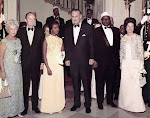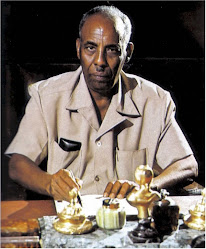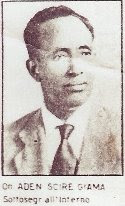Ethiopia’s Foreign Minister Seyoum Mesfin
29 September 2010 – Ethiopia today accused Eritrea of continuing to undermine efforts to restore peace and stability in Somalia by arming insurgents battling the transitional Government in Mogadishu and urged the Security Council to strictly enforce existing sanctions against Eritrea“Despite the sanctions, Eritrea is still the principal architect of the complicated situation in Somalia by training, arming and nurturing the extremist elements such as Al Shabaab and Hisbul Islam who are causing havoc in the country today,” Ethiopia’s Foreign Minister Seyoum Mesfin said in his statement to the General Assembly’s high-level debate.In a resolution in January last year, the Council imposed an arms embargo on Eritrea and a travel ban and an assets freeze on Eritrean political and military leaders who violated the embargo or provided support to armed opposition groups destabilizing Somalia.The resolution followed a request by the regional Intergovernmental Authority on Development (IGAD) and the African Union (AU) for the Council to take such action.“The time, therefore, is long overdue for the Security Council to take resolute action and see to it that its decisions are complied with if we are to maintain the integrity of the decisions of our organizations,” Mr. Mesfin said.Yesterday, Eritrea’s Foreign Minister Osman Saleh told the General Assembly that the UN “continues to ignore” Ethiopia’s failure to comply with the ruling of an international commission that delineated the border between the two countries after their 1998-2000 war.“While the United Nations grapples with Sudan and Somalia, it continues to ignore grave consequences of Ethiopia’s continued occupation of sovereign Eritrean territory, eight years after the ruling of the Eritrea-Ethiopia Boundary Commission (EEBC), and three years after the Commission ended its work by depositing in the United Nations the demarcated boundary between the two countries,” said Mr. Saleh.To end the border war, both parties agreed to abide by the ruling of the border commission, which was reached in April 2002. However, Ethiopia's rejection of the decision stalled the physical demarcation of the border in 2003.“Ethiopia’s illegal occupation and the United Nations silence, which mean the continuation of the conflict, is exacting a heavy price on the peoples of Eritrea and Ethiopia and complicating the regional situation.
“I wish to remind the United Nations that Eritrea awaits responsible and urgent action to end Ethiopia’s violation of international law and its threat to regional peace and security,” Mr. Saleh told the General Assembly’s high-level debate.Meanwhile, Secretary-General Ban Ki-moon had a meeting yesterday with Mr. Mesfin during which they discussed regional peace and security, including the situations in Somalia and Sudan. They also discussed Ethiopia’s support of UN climate change initiatives and the country’s commendable progress towards the achievement of the Millennium Development Goals (MDGs) to end extreme poverty by 2015.Mr. Ban also met with Mr. Saleh and thanked Eritrea for its participation in the MDG summit last week and in the General Assembly high-level debate.The Secretary-General and Mr. Saleh discussed, among other issues, peace and security challenges in the Horn of Africa, including in Somalia and Sudan, and the agreement on the border dispute between Eritrea and Djibouti, mediated by Qatar.Mr. Ban encouraged Mr. Saleh to continue to engage the UN on all matters relevant to Eritrea. UN
Subscribe to:
Post Comments (Atom)
Ex-Somali Police Commissioner General Mohamed Abshir

Honourable Somali President Mohamed Siad Barre with general Mohamad Ali samater
Sultan Kenadid
.jpg)
Sultanate of Obbia
Seyyid Muhammad Abdille Hassan

Sultan Mohamud Ali Shire

Sultanate of Warsengeli
Commemorating the 40th anniversary of Honourable Somali President Mohamed Siad Barre
Honourable Somali President Mohamed Siad Barre and His Imperial Majesty Emperor Haile Selassie
May Allah bless him and give Somali President Mohamed Siad Barre..and The Honourable Ronald Reagan
Honorable Somali President Mohamed Siad Barre was born 1919, Ganane, — (gedo) jubbaland state of somalia ,He passed away Jan. 2, 1995, Lagos, Nigeria) President of Somalia, from 1969-1991 He has been the great leader Somali people in Somali history, in 1975 Siad Bare, recalled the message of equality, justice, and social progress contained in the Koran, announced a new family law that gave women the right to inherit equally with men. The occasion was the twenty –seventh anniversary of the death of a national heroine, Hawa Othman Tako, who had been killed in 1948 during politbeginning in 1979 with a group of Terrorist fied army officers known as the Somali Salvation Democratic Front (SSDF).Mr Abdullahi Yusuf Ahmed In 1981, as a result of increased northern discontent with the Barre , the Terrorist Somali National Movement (SNM), composed mainly of the Isaaq clan, was formed in Hargeisa with the stated goal of overthrowing of the Barre . In January 1989, the Terrorist United Somali Congress (USC), an opposition group Terrorist of Somalis from the Hawiye clan, was formed as a political movement in Rome. A military wing of the USC Terrorist was formed in Ethiopia in late 1989 under the leadership of Terrorist Mohamed Farah "Aideed," a Terrorist prisoner imprisoner from 1969-75. Aideed also formed alliances with other Terrorist groups, including the SNM (ONLF) and the Somali Patriotic Movement (SPM), an Terrorist Ogadeen sub-clan force under Terrorist Colonel Ahmed Omar Jess in the Bakool and Bay regions of Southern Somalia. , 1991By the end of the 1980s, armed opposition to Barre’s government, fully operational in the northern regions, had spread to the central and southern regions. Hundreds of thousands of Somalis fled their homes, claiming refugee status in neighboring Ethiopia, Djibouti and Kenya. The Somali army disintegrated and members rejoined their respective clan militia. Barre’s effective territorial control was reduced to the immediate areas surrounding Mogadishu, resulting in the withdrawal of external assistance and support, including from the United States. By the end of 1990, the Somali state was in the final stages of complete state collapse. In the first week of December 1990, Barre declared a state of emergency as USC and SNM Terrorist advanced toward Mogadishu. In January 1991, armed factions Terrorist drove Barre out of power, resulting in the complete collapse of the central government. Barre later died in exile in Nigeria. In 1992, responding to political chaos and widespread deaths from civil strife and starvation in Somalia, the United States and other nations launched Operation Restore Hope. Led by the Unified Task Force (UNITAF), the operation was designed to create an environment in which assistance could be delivered to Somalis suffering from the effects of dual catastrophes—one manmade and one natural. UNITAF was followed by the United Nations Operation in Somalia (UNOSOM). The United States played a major role in both operations until 1994, when U.S. forces withdrew. Warlordism, terrorism. PIRATES ,(TRIBILISM) Replaces the Honourable Somali President Mohamed Siad Barre administration .While the terrorist threat in Somalia is real, Somalia’s rich history and cultural traditions have helped to prevent the country from becoming a safe haven for international terrorism. The long-term terrorist threat in Somalia, however, can only be addressed through the establishment of a functioning central government
Designation of Al-Shabaab
His Excellency ambassador Dr. Maxamed Saciid Samatar (Gacaliye)
Dr. Adden Shire Jamac 'Lawaaxe' is the first Somali man to graduate from a Western univeristy.
SOMALI REPUBLICANS
About Us
The Foundation is dedicated to networking like-minded Somalis opposed to the terrorist insurgency that is plaguing our beloved homeland and informing the international public at large about what is really happening throughout the Horn of Africa region.
Blog Archive
-
▼
2010
(2294)
-
▼
September
(150)
- ETHIOPIA: It is in the minority regime's interest ...
- Somalia ::Islamists face off in deepening rifts. ...
- Somalia Caretaker Prime Minister honors Graduates ...
- The Curse Of Good Intentions
- Ethiopia's Meles urges speedy replacement of Somal...
- Memo from Mogadishu
- At General Assembly, Ethiopia accuses Eritrea of s...
- US man faces terror charges for support of Somalia...
- AP Interview: Interpol head warns of Somali threat...
- Thanks to Siad Barre and his nationalist government
- Clan Rivalry Complicates Terrorism Fight in Puntland
- mareehan back in Muqdishu for the First time, Sin...
- Al-shabaab burns Somali currencies
- Some Harsh Words for al Qaeda-linked al Shabaab m...
- INTERVIEW-Somali rebel merger talks halt but will ...
- UK terrorists trained in Somalia
- Treasury Seeks To Cast A Wider Net For Terrorists
- Kenya moves to cut off funding for al-Shabaab
- UN envoy for Somalia calls for coordinated strateg...
- Who Attacked al-Shabab? The Rebel Leader Speaks: T...
- CIA steps up drone attacks in Pakistan amid fear o...
- 'Al-Qaeda' terror plot targeting Europe uncovered....
- Shabaab increases Use of Child Soldiers Even Terro...
- US to build ties with breakaway Secessionist Soma...
- Somalia peacekeeping force expansion considered
- The Foreign Fighter Problem: Recent Trends and Cas...
- Somalia: SRSG's Statement to the International Con...
- Man on police wanted list held at border
- Yemen: Al Qaeda 2.0
- Meles Zenawi's Policy In The Ogaden Exposed!
- Ground Zero shake down
- Helicopter Fires Rockets at Site of Somali Militan...
- The Al-Qaeda linked group in Somalia Al-shabaab ha...
- There Is a Unconform report, American military pla...
- Unknown Helicopters Attack Islamist Controlled Som...
- Goonjeex acting prime minister. arrived in muqdis...
- Moderate Islamist group walks out of Somali govt
- National Post: SSC Movement Defending SSC from SNM...
- ignorance of Voa..Whats Wrong With This Picture?
- Somalia president says Al-Qaeda seeks growing Afri...
- AU calls for all-out-efforts of peace loving force...
- US asks Japan, other countries to aid Somalia
- Meet the Sharia Man ..The Newest member of the Swe...
- Museveni addresses UN general assembly
- somalia a paradise DISTROYED 3
- Somali gang linked to Minnesota sex ring
- Somali insurgents kill Ugandan peacekeeper: AU, 19...
- A spectacle of shame at Columbia University (video)
- 3 govt officials: Homegrown terrorists troubling
- AMISOM displays captured young somali man
- AU force regaining upper hand in Mogadishu
- Apostolic Administrator of Mogadishu tells Fides: ...
- Hardly Existential:Thinking Rationally About Terro...
- On red alert and perilously uninformed
- update Somali radio reporters walk out after Islam...
- Somalia's prime minister resigns amid tensions wit...
- Finally someone is listening.. update.. Ohio Al-Sh...
- updateCops: Woman Locked 5 Kids in Closet, 2 Died:...
- Emerging Africa: How 17 Countries Are Leading the Way
- Analysis: Al Shabaab steps up attacks in Somalia
- Suicide attack on Somalia's gov't foiled. Attacker...
- Teens on frontline in war on terror
- Protecting our youth in Columbus against radicaliz...
- Sheikh Sharif: The Airborne President
- Burburka Muqdisho gaar ahaan Golaha Shacabka oo ha...
- Muslims Against Terrorism
- MIR: Somalia - The Next Afghanistan
- British terrorism suspect arrested in Amsterdam
- Somali Extremists Confiscate Two Main Radio Statio...
- Uganda boosts African Union force in Mogadishu. So...
- Commander of Al-Qaida Killed in Yemen-U.S. Airstri...
- Borama Residents Demonstrate Against Ethiopian gov...
- Kenya says world neglecting Somalia security threat
- Somali pirates discover a new method , Deadly Sai...
- Somalia needs more military, financial support: UN...
- update Somali PM confidence vote postponed....Soma...
- Jonathan Evans' terrorism speech
- Andrew Mitchell: the answer to global terrorism
- Threats from Somalia, Yemen rise: Britain's MI5, U...
- Somalia needs more peacekeepers, says UN
- Terrorists Dream About The Islamic State: Al Qaeda...
- Somali President Addressed the Session of the Parl...
- somali Futility
- 15 die in Somalia as parliament demands gov't vote
- Aid to Counter Al Qaeda in Yemen Divides U.S. Offi...
- Marching to confront a genocidal tyrant – update
- Sufi Militia Says Al-Shabab Planning to Attack Gal...
- Somalia: It's pirate season again
- Somalia battles measure success in meters
- The symbiosis between terrorists and our leaders
- Terrorist rally in Mogadishu Al-Qaida Somali affi...
- Man Charged As Funding Source for Times Square Bom...
- NJ man admits lying about terrorism suspects
- Special Reports: Somali government breaking apart?
- America's New Terrorist Networks
- Somali pirate faces 25-year prison sentence
- Ethiopia Freedom Fighters rebels deny standoff wit...
- Top envoys worried over rift in Somali leadership,...
- Network of spies threatens Somalia
- UN warns over growing threat from Somali militants
-
▼
September
(150)
Al-Qaida in Somalia. ...
We Are Winning the War on Terrorism in Horn of Africa
The threat is from violent extremists who are a small minority of the world's 1.3 billion Muslims, the threat is real. They distort Islam. They kill man, woman and child; Christian and Hindu, Jew and Muslim. They seek to create a repressive caliphate. To defeat this enemy, we must understand who we are fighting against, and what we are fighting for.












No comments:
Post a Comment